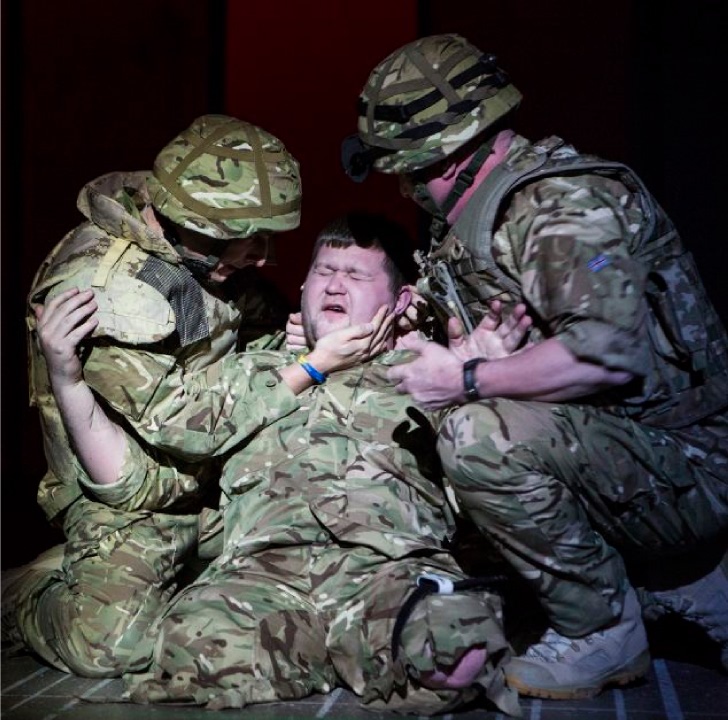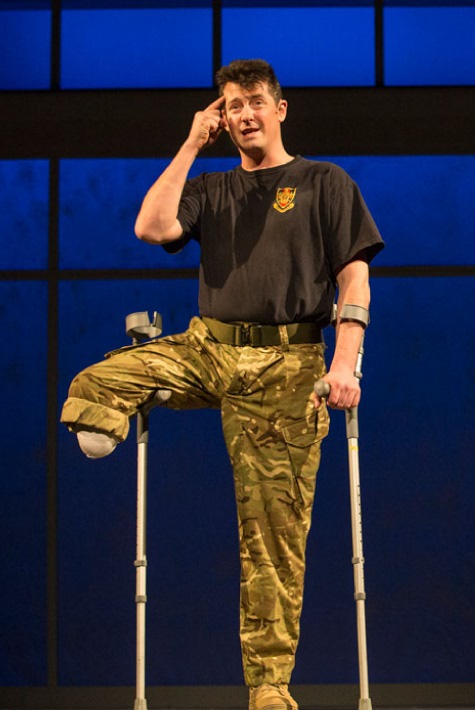|
A world apart brought home

Dan Shaw as rifleman Leroy Jenkins, who, like
Dan, lost both legs to an IED going to the aid of a colleague
The Two Worlds of Charlie F
Wolverhampton Grand
WHAT started out as a gala performance by
injured servicemen with no real ambitions beyond showing the horrors
faced by the wounded, the casualties of modern warfare, and the
therapeutic effects of theatre, has come of age. It is now a fully
fledged touring show.
That has the advantage that the performace is
perhaps slicker and more sophisticated than it was when it made its last
visit to the Midlands 20 months ago, it is more at home on stage, but
that comes at a cost in that some of the raw emotion, the urgency and
the power of naked honesty has, inevitably, lost a little of its jagged
edge.
Not that matters too much, there is still plenty
of emotion to spread around. There are few anti-war messages as strong
as seeing the effects in terms of lives lost and damaged in stark
reality. It does not need moralising or philosophical argument. A
squaddie with no legs, or an officer whose brain’s wiring has been fried
by a head wound is the only argument you really need.
Charlie F is impossible to give a star rating; it
is not a play, despite its cast acting out parts, it is not a musical or
a lecture or . . . it is Charlie F, a one off. An uncomfortable and at
times moving experience as episode after episode unfolds in waves before
us.
We have the new recruits full of hope and
ambition, the excitement of blueys, the airmail letters from home,
arriving and the inevitable dear John letters as the strain tells on
relationships.
Then there are the explosions, the mortar attacks
and fire fights, unexpected and loud enough to make most of the audience
jump. And then there are the casualties, the civilians, collateral damage, or just plain cock-ups, errors of intelligence, those
are the deaths that prey on minds, along with the personal hurt and fear
of mates and oppos killed and maimed.
collateral damage, or just plain cock-ups, errors of intelligence, those
are the deaths that prey on minds, along with the personal hurt and fear
of mates and oppos killed and maimed.
The maiming can be obvious, a missing leg or two
is a bit of a giveaway, but the damage can take many forms, there is the
constant pain from a broken back for instance, a head wound that
diminishes the ability to think, mental problems, wounds that might be
less obvious than missing limbs but are just as unable to heal.
Most telling and sobering is a matter of fact
demonstration of what happens when you step on an IED, an improvised
explosive device, assuming it is not laced with pebbles, nails or
whatever, off course.
Cassidy Little as amputee Charlie F, and your guide for
the evening
Losing a leg beneath the knee is the best you
can hope for. The chances are you will lose fingers, your gun with smash
into your jaw and cheekbone, you will get blast and shrapnel injuries
and the eylets from your boots will rip into your groin if you are not
wearing blast trousers. A litany of pain and hurt which leaves you in
admiration not only for the soldiers sent their by our Government and at
the skill of surgeons and staff who put what is left back together at
Selly Oak hospital here in Birmingham, the centre for the injuries of
conflict.
The rehabilitation is long and painful with the
added danger of addiction to the prescription drugs to combat the pain
or fight depression, or help induce sleep then there are drugs to fight
infection, as well as drugs to combat the side effect of drugs taken to
survive.
There is a strain on families and relationships,
the anger and frustration, thoughts of suicide, of guilt at having
survived, fury at . . . anything and everything. Marriages that break
down because partners cannot take any more or give any more. These are
the words and lives of real soldiers, some even among the cast,
chronicled by writer Owen Sheers.
Many of the cast are originals, led by Canadian
Cassidy Little, who has the look of a 1950’s matinee idol. Little, a
medic in 42 Commando, lost a leg to an IED in his second tour of
Afghanistan. He had a theatrical education and some stage experience
before joining the Royal Marines for a bet.
There is Lt Col (retd) Stewart Hill who suffered
a devastating brain injury leaving him unable to command men, former
rifeleman Dan Shaw who lost both legs in Afghanistan, former corporal
Steve Shaw and Bombadier Gareth Crabbe both with severe spine injuries,
Former L/cpl Maurillia Simpson from Trinidad and Tobago with a severe
leg injury.
A survivor of a past war Darren Swift, now an
actor, lost both legs to an IED, the Provisional IRA’s contribution to
modern warfare, while serving in Northern Ireland in the early 1990s
while L/Cpl Ash Young suffered severe leg damage seven years ago.
They are joined by actors Teri Ann Bobb-Baxter.
Tom Colley, Miriam Cooper, Tomos Eames, Venetia Maitland, Owen Oldroyd
and Lily Philips.
Sheers and director Stephen Rayne avoid allowing
the play to become over sentimental - there is no Hollywood-style living
happily ever after here; they just tell it like it is and the result is
stark and hard hitting, real live hiding as drama. It is a production
that deserves to be seen after all we are all part of it - the injuries
were suffered all in our name. Incidentally the language is of the
barrack room variety, no holds barred. To 29-03-14.
Roger Clarke
Another view from the front
****
FROM wounded heroes of the battlefields
in Afghanistan to shoot-from-the-lip stars of the stage, the cast of
this powerful drama tell it as it really is . . . and in strong
language!
Their missing limbs show the horrors of a war
that, from past experience, seems unwinnable, but others have paid the
price of conflict with serious psychological problems.
Owen Sheers’ play, using some professional actors
but mainly medically discharged troops, has improved since I first saw
it two years ago, and the message seems even more raw and powerful.
“Do not forget,” urges one of the leads, Canadian
Cassidy Little, at the final curtain. The emotional standing ovation
from the rather small opening night audience suggests they never will.
Cassidy, who joined the Royal Marines for a bet,
had his right leg blown off just below the knee, his left leg badly
scarred, and damage to his pelvis and left eye. His life was saved by
doctors and nurses in Birmingham.
There’s plenty of humour in the show, and some
pleasant musical numbers, as well as heartbreak and battlefield
language, while recordings of the rattle of gunfire and massive
explosions bring home the terror of war, as do the description of
shocking wounds and the value of wearing ‘blast pants’.
A particularly poignant moment, too, when
Lieutenant Colonel (retired) Stewart ‘Benny’ Hill, injured when a piece
of shrapnel from an improvised explosive device tore into his brain,
recalled: “I went from commanding hundreds of men to being unable to
command myself” To 29-03-14.
Paul Marston
|

